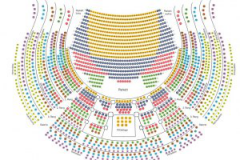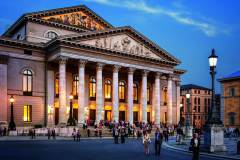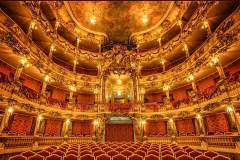Turandot
October 2024 | ||||||
|---|---|---|---|---|---|---|
Mo | Tu | We | Th | Fr | Sa | Su |
Turandot, the princess with the heart of ice
In the year 2046 Europe, once so wealthy, is completely under Chinese rule. More than thirty years before, China had saved Europe from financial ruin by buying up all its debts, possessions and natural resources. China is now the new world power. Turandot, the princess with the heart of ice, is very much like Big Brother in her treatment of the citizens of Europe. They are to pay back every last cent and settle the debts of their parents‘ generation.
Act One
In a cold ice stadium the citizens are awaiting the great spectacle of a public execution. Mandarino, Turandot’s representative, announces that Princess Turandot will only marry the prince who solves her three riddles. Since the last candidate – the Prince of Persia no less- was unable to solve the riddles he is to be beheaded. To help increase the sense of anticipation for the execution a game of hockey is played. Timur, a blind old man, falls to the ground in the crowd. His servant, Liù, begs for help. A stranger, Calaf, whom nobody knows, hurries up and recognises his father in the old man, the former King of Tartary who fled into exile and whom his son thought was dead.
The spectacle of the execution continues. After the arrival of the executioner, Pu-Tin-Pao, and his assistant, the Prince of Persian is brought in and arouses sympathy amongst the public. The spectators cover their eyes at the appearance of Turandot, who remains unmoved and gives the sign that the execution should go forward. Calaf is overwhelmed by the beauty of the princess and decides, in spite of the warnings of Timur, Liù and the ministers Ping, Pang and Pong, to announce himself as a new candidate with three beats of the gong.
Act Two
Ping, Pang and Pong bemoan the fate of the victims of Turandot’s capriciousness. Under the influence of alcohol they wax nostalgic about better times and peace in their homeland. Memories of the past and a desirable vision of a life of warmth and sensuousness come before their mind’s eye. The people, in orderly and efficient manner, make preparations for the latest candidate’s courtship challenge. A parade in honour of the Emperor takes place in front of the skyscraper building of the public television authority. Emperor Altoum fails in his attempt to persuade the unknown prince not to take up the challenge. At this point Turandot appears: she recounts how her ancestor, the Princess Lo-u-Ling, was raped by a stranger – like Calaf – and how her suffering has become embedded deeply in her own soul. This is the reason, she adds, why she protects herself with the cruel courtship ritual and presents each candidate for her hand with three riddles. Calaf, however, solves all three riddles one after the other. The princess‘ veneer of ice begins to melt. When the unknown prince has solved the final riddle, he demands his prize. But Turandot flees to her father and begs him to break his promise and not give her to this stranger. Upon this Calaf, in his turn, offers Turandot a riddle: if she can find out his name by the next morning he will accept death as his reward.
Act Three
Nobody sleeps in the city that night. All the citizens want to know the name of the stranger. Ping, Pang and Pong try everything in their power to make Calaf change his mind but he resists all their attempts to bribe him. At this Timur and Liù, who have been seen in the company of the stranger, are dragged in. As they seem to know him, Turandot demands to be told the true identity of the successsful candidate. Liù places herself in front of Timur and claims that only she knows the name. The torturer, Pu-Tin-Pao, is called in to subject her to the bamboo torture, in which a bamboo slowly grows through the body of the victim. But Liù does not yield, she does not give the name and tells Turandot that Love has given her the strength for this sacrifice. She kills herself without having revealed the name. But Liù’s sacrifice transforms society. The old Tao philosophy experiences a revival and Turandot understands the meaning of love.
At this point Puccini’s manuscript ends. Liù is now the stuff of poetry...
Carlus Padrissa
Program and cast
Dramma lirico in three acts (five tableaux) - 1926
In Italian with German and English surtitles.
Duration approximately 2 hours 45 minutes
Conductor: Antonino Fogliani
Production: Carlus Padrissa - La Fura dels Baus
Set Design: Roland Olbeter
Costume Design: Chu Uroz
Video: Franc Aleu
Lighting: Urs Schönebaum
Dramaturgy: Andrea Schönhofer, Rainer Karlitschek
Choruses: Stellario Fagone
La principessa Turandot: Sondra Radvanovsky
L'imperatore Altoum: Kevin Conners
Timur, Re tartaro spodestato: Vitalij Kowaljow
Il principe ignoto (Calaf): Yonghoon Lee
Liù: Selene Zanetti
Ping: Thomas Mole
Pang: Tansel Akzeybek
Pong: Andrés Agudelo
Un mandarino: Bálint Szabó
Il principe di Persia: Andrés Agudelo
Children‘s Chorus: Kinderchor der Bayerischen Staatsoper
Bayerisches Staatsorchester
Chorus, extra chorus and children's chorus of the Bayerische Staatsoper
National Theatre Munich
The National Theatre Munich (German: Nationaltheater München) is an opera house in Max-Joseph-Platz in Munich, Germany. It is the home of the Bavarian State Opera and the Bayerisches Staatsballett(Bavarian State Ballet).
The Bavarian State Opera also performs in the Prinzregententheater, which opened in 1901 and, like the Bayreuth Festspielhaus, is built to Richard Wagner's specifications, and in the Cuvilliés Theatre at the Residenz, constructed in 1751–1753 and described by Thierry Beauvert as "a Rococo gem".
The Nationaltheater is very easy to get to both by car and by MVV public transportation.
By MVV public transportation
S-Bahn: S 1 - 8 Marienplatz
U-Bahn: U 3, 6 Marienplatz, U 3 - 6 Odeonsplatz
Bus: 52, 131 Marienplatz, 100 Odeonsplatz
Straßenbahn: 19 Nationaltheater
On the day of the performance, holders of regular tickets are entitled to use public transport provided by the Münchner Verkehrsverbund (MVV). This service starts at 3 pm respectively three hours before the performance commences and ends with the closing hour of the MVV.
By Car
Take the Altstadt-Ring to Maximilianstraße.
Parking garage Max-Joseph-Platz: open Monday to Sunday from 6:00 A.M. to 2:00 A.M.
You can take advantage of the special theatre parking fee of Euro 10,- from 6:00 P.M. to 8:00 A.M. by presenting your admission tickets.

 EN
EN DE
DE IT
IT FR
FR ES
ES RU
RU JP
JP RO
RO
 Seating plan
Seating plan 
